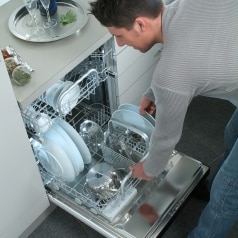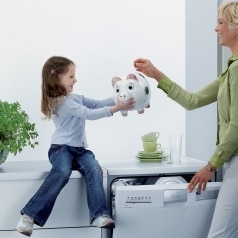Did you know that Swedes are less likely to fully load their dishwashers and washing machines? Or that the Dutch are the most likely to turn off their electrical appliances, rather than leave them on standby mode?
These are two of the findings in an OECD survey of people’s behavior towards the environment, based on more than 10,000 responses in 10 countries. As shown on www.electrolux.com/WaterSavings, even if not fully loaded dishwashers offer substantial water savings compared to hand dish.
Of the countries monitored, people in the Netherlands are most likely to full load their dishwashers and washing machines, closely followed by people in Canada, Australia, the Czech Republic and France. People in Italy and Norway are also rather disciplined, while the Swedes, Mexicans and Koreans are worst in class.
Fully loaded or not, dishwashers offer substantial water savings compared to doing the dishes by hand. It takes an average of 103 liters of water to hand wash the amount of dishes equivalent to a fully loaded dishwasher, compared to the 12 liters of water it takes to clean the amount of dishes in a modern dishwasher.
At www.electrolux.com/WaterSavings you can calculate how much water this could save in your household, town or country. (www.electrolux.com/WaterSavings_US for the US.) If all households in Europe used a modern dishwasher, the amount of water annually consumed by the whole of Denmark could be saved.
The OECD survey also shows that while those who say they are concerned about the environment are taking action, other consumers will also change their behavior if given the right incentives and information. This proves the efficiency of government initiatives to improve energy efficiency, including providing grants to households for installing energy-efficient appliances.
Such initiatives have been taken in several countries around the world, recently by President Obama in the US. And studies reveal such initiatives work. For a couple of years in the beginning of the 2000’s, the Netherlands ran a rebate program for purchases of energy efficient (A class) appliances. During this period Netherlands transformed its appliance stock into one of EU’s most modern. In Italy, since the introduction in 2007 of tax credits for energy efficient fridges and freezers, there has been a significant shift in sales. The market share of A+ and A++ refrigerators/freezers increased from just over 10% in 2006, the year before the tax credit, to almost 50% in 2008.
Electrolux advocates consumer tax incentives to replace energy-thirsty, old appliances with efficient ones. According to an analysis from McKinsey, swapping appliances cost-effective method to cut emissions of greenhouse gases. If all ten year old (and older) appliances were replaced with new, energy-efficient ones, Europe alone we could reduce its CO2 emissions by almost 20 million tons per year.
The survey was based on more than 10,000 responses gathered in 2008. A summary can be found here.
Read more about how much energy could be saved if European or US households replaced all appliances that are older than 10 years.
Read more about Electrolux and sustainability.
For more information
Contact the Electrolux Press Hotline on +46 8 657 6507 or press@electrolux.com.



